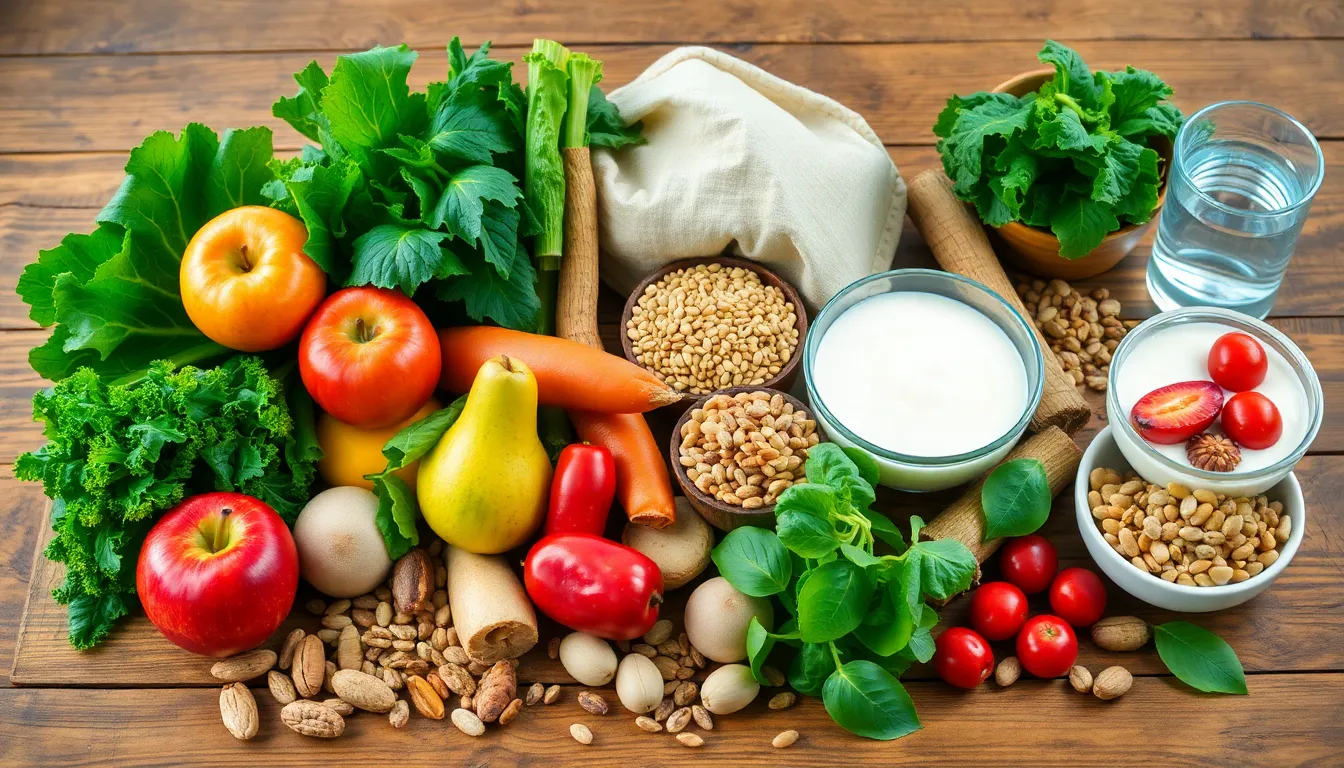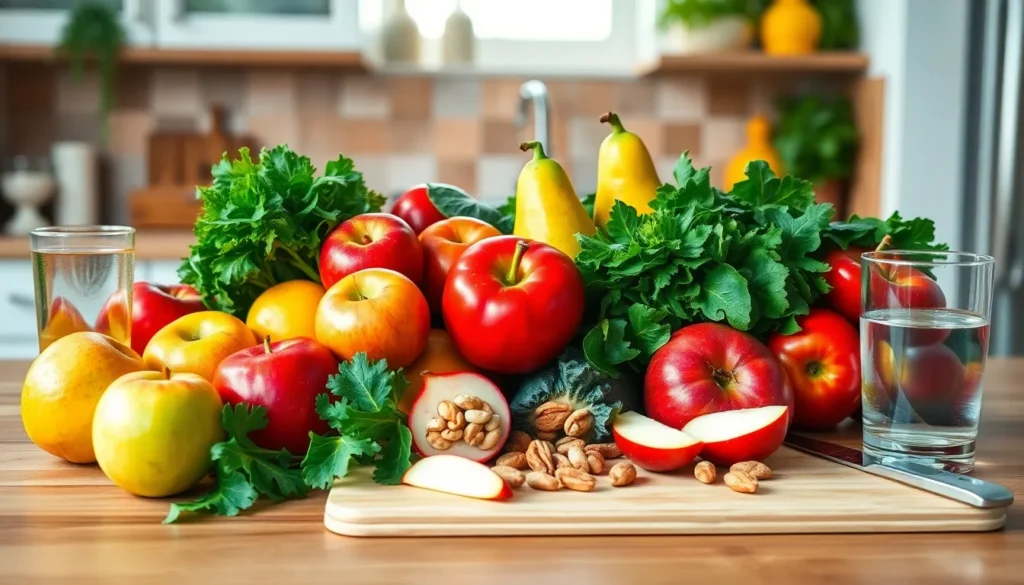Table of Contents
ToggleWhen nature calls and the bathroom becomes a battleground, knowing what to eat can be your secret weapon. Imagine a world where you can bid farewell to constipation and embrace smooth sailing. The right foods can transform your digestive woes into a symphony of relief, turning your daily routine into a more pleasant experience.
Understanding Digestive Health
Digestive health significantly affects an individual’s well-being, with diet playing a crucial role. Eating the right foods not only alleviates digestive issues but also enhances overall quality of life.
Importance of Diet in Digestion
Nutrition directly impacts digestion and bowel movements. Fiber-rich foods, such as fruits, vegetables, and whole grains, promote regularity and support gut health. Hydration also contributes to a smooth digestive process. Water aids in breaking down food and facilitating nutrient absorption. High-fat and processed foods often lead to discomfort and constipation. Individuals prioritize whole, minimally processed options to foster better digestive functioning.
Common Digestive Issues
Constipation frequently occurs due to inadequate fiber intake, lack of hydration, or sedentary lifestyle choices. Bloating can arise from consuming gaseous foods or eating too quickly. Diarrhea sometimes results from food intolerances or infections. Each of these issues highlights the necessity of a balanced diet. Specific foods can relieve these conditions, creating a more comfortable digestive experience. Understanding the causes fosters better food choices and improved digestive health over time.
Foods That Promote Healthy Bowel Movements

Diet plays a significant role in digestive health. Incorporating specific foods can enhance bowel movements and alleviate constipation.
High-Fiber Foods
High-fiber foods contribute to regular bowel movements. Fruits like apples, pears, and berries pack essential soluble and insoluble fibers. Leafy greens, such as spinach and kale, add bulk to the stool. Whole grains like oatmeal and brown rice enhance digestive transit time. Nuts and seeds, including chia and flaxseeds, provide additional fiber and healthy fats. Aim for at least 25 grams of fiber daily for optimal results.
Hydrating Foods
Hydration supports proper digestion and prevents constipation. Water-rich foods like cucumbers, watermelons, and oranges help maintain fluid balance. Incorporating soups and broths enhances overall fluid intake. Various vegetables, including celery and radishes, offer excellent hydration alongside nutrients. Aim for a combination of these foods throughout the day to complement water intake.
Probiotic-Rich Foods
Probiotic-rich foods foster gut health and enhance bowel regularity. Yogurt with live cultures contains beneficial bacteria that support digestion. Fermented foods, such as sauerkraut and kimchi, offer similar benefits. Kefir provides a drinkable source of probiotics for easy consumption. Including these foods regularly can promote a balanced gut microbiome, aiding in smoother digestion.
Specific Food Recommendations
Diet plays a crucial role in promoting regular bowel movements. Selecting the right foods contributes to improved digestive health.
Fruits and Vegetables
Fruits and vegetables are rich in fiber, which promotes healthy digestion. Apples and pears contain soluble fiber, encouraging regularity. Leafy greens, such as spinach and kale, provide essential nutrients and aid digestion. Berries, like strawberries and raspberries, offer additional fiber and antioxidants. Aim to incorporate a variety of these foods into daily meals for optimal digestive support.
Whole Grains
Whole grains are an excellent source of fiber and essential vitamins. Choices like brown rice, quinoa, and oats help maintain bowel regularity. These grains contain both soluble and insoluble fiber, promoting effective digestion. Including whole-grain bread and pasta enhances fiber intake, further supporting gut health. Adults should target a daily intake of at least six servings of whole grains for improved digestive function.
Nuts and Seeds
Nuts and seeds provide healthy fats and fiber, aiding digestion. Almonds and walnuts offer protein along with beneficial fiber, promoting regularity. Chia seeds and flaxseeds are particularly high in soluble fiber, which absorbs water and adds bulk to stools. Consuming a handful of nuts or a tablespoon of seeds daily enhances nutrient intake and supports digestive health. Integrating these snacks into diets fosters better digestive outcomes.
Lifestyle Tips for Better Digestion
Improving digestion often requires lifestyle adjustments alongside dietary changes. Implementing these tips can lead to a more efficient digestive process.
Staying Hydrated
Hydration plays a vital role in digestion. Water ensures that food moves smoothly through the digestive tract, preventing constipation. It’s recommended to drink at least eight 8-ounce glasses of water daily. Fruits and vegetables also serve as additional hydration sources, with cucumbers and watermelons being excellent examples. Incorporating herbal teas can provide added fluid while offering soothing effects on the stomach. Monitoring hydration levels is essential, especially for those consuming a high-fiber diet, as fiber absorbs water. Maintaining an adequate fluid intake leads to improved bowel regularity.
Regular Exercise
Regular physical activity significantly enhances digestion. Aerobic exercises like walking, jogging, and cycling stimulate gut motility. Engaging in at least 150 minutes of moderate exercise weekly benefits overall digestive health. Additionally, strength training supports muscle tone, which helps move food through the intestines efficiently. Stretching and yoga can also alleviate bloating and promote relaxation within the gastrointestinal system. Overall, adopting a consistent exercise routine complements dietary choices, leading to optimal digestive function.
A well-balanced diet plays a vital role in maintaining digestive health and promoting regular bowel movements. By incorporating fiber-rich foods like fruits, vegetables, whole grains, nuts, and seeds, individuals can significantly improve their digestive experiences. Staying hydrated and including probiotic-rich options can further enhance gut function and alleviate discomfort.
Making these dietary changes along with regular exercise can lead to lasting benefits for overall well-being. Prioritizing nutrition and hydration not only aids in relieving constipation but also fosters a healthier lifestyle. Embracing these practices can transform daily routines and contribute to a happier digestive system.







